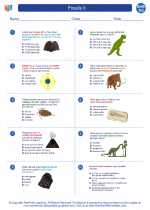Octopuses: A Fascinating Species
Octopuses are remarkable creatures that belong to the class Cephalopoda, which also includes squid, cuttlefish, and nautiluses. They are known for their intelligence, unique appearance, and remarkable abilities. Let's delve into the fascinating world of octopuses and explore their anatomy, behavior, and ecological significance.
Anatomy of Octopuses
Octopuses have a distinct body structure characterized by a soft, bag-like body called the mantle, which houses their vital organs. They possess eight muscular arms lined with suction cups, allowing them to grasp and manipulate objects with remarkable dexterity. Their large, expressive eyes provide keen vision and contribute to their inquisitive nature.
Behavior and Intelligence
One of the most intriguing aspects of octopuses is their exceptional intelligence. They have demonstrated problem-solving abilities, learning capacity, and even the use of tools in their natural environment. Their advanced cognitive skills make them a subject of great interest in scientific research, as they exhibit behavior that challenges traditional notions of animal intelligence.
Ecological Significance
Octopuses play a crucial role in marine ecosystems as both predators and prey. Their predatory nature helps regulate the populations of crustaceans, mollusks, and small fish, contributing to the overall balance of the oceanic food web. Additionally, they serve as a food source for larger marine predators, highlighting their significance within the complex web of marine life.
Study Guide
If you're interested in learning more about octopuses, here are some key topics to explore:
- Evolutionary History: Investigate the evolutionary lineage of octopuses and their closest relatives within the cephalopod class.
- Camouflage and Color-changing Abilities: Explore the mechanisms behind an octopus's remarkable ability to change color and texture for camouflage and communication.
- Reproduction and Life Cycle: Examine the reproductive strategies and life cycle stages of octopuses, including their unique mating behaviors and parental care.
- Environmental Adaptations: Research how octopuses have adapted to various marine environments, from shallow coastal waters to the depths of the ocean.
- Conservation Challenges: Investigate the conservation status of different octopus species and the challenges they face due to human activities and environmental changes.
By delving into these topics, you'll gain a comprehensive understanding of the fascinating world of octopuses and the significant role they play in marine ecosystems.



